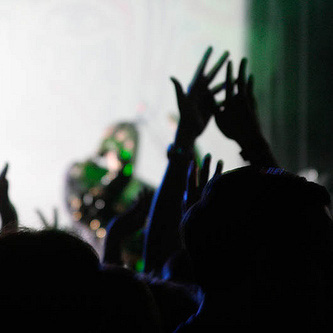Iceland Airwaves is getting big coverage in Seattle this year. Listening in, you may have a few thoughts: 1) damn, that sounds like fun, and 2) isn’t it slightly unfair that hundreds of local bands can’t get coverage, while obscure bands from a country of 300,000 can?
To which I reply: it’s damned fun. The concerts are hot and cold– you really don’t come across the soul-draining competent pop that dominates other festivals. You get stuff that will evoke possibly a viciously negative response, or a “damn that’s brilliant” response. And Icelandic musicians deserve the coverage and all the help they can get. What you don’t realize when you just chime in for a festival is that the Icelandic market can’t support its own bands. In addition, building a touring strategy from a remote island in the North Atlantic is more than a little tricky. So a number of bands who are truly great get four days of exposure to the world, then may or may not find themselves stranded in London or Denver, playing to a crowd of aged bikers who want to hear some blues or Irish rock.
All that said, any festival has its limitations.
When I was a young reporter and musician in Reykjavik, I came across a character who calls himself gimaldin (real name Gisli Magnusson, lowercase intentional, bio here: Gímaldin og félagar). At the time, he led a political folk band called The Fifth Column, and he showed up at, say, swimming pools with a four piece band singing complex folk cycles. He was competent on a number of instruments. Any given night, his folk band might break into a 10 minute acid jazz number. I always asked about him, and none of the established bands knew what to say, except he had a very very famous father.
This year, gimaldin has released an impressive full-length LP, Þú ert ekki sá sem ég valdi – translated the title is You Are Not Who I Chose. It’s compelling folk material and it derives from one of my favorite singers . . . gimaldin’s very famous father, Megas. There’s more, though. Gimaldin has found a key to his father’s famous delivery–he is able to find the musicality in the Icelandic language. He does this not by cutting down syllables and going basic and childlike, but with a more traditional rimur-based take. Uh . . . that sounds heady. Anyway, it’s astonishing to hear a complex language roll off the tongue and float over folk arrangements.
What’s even more impressive to me is the way gimaldin has modified chord usage and countermelody lines to match the language. In my opinion, he has figured out how to build the modern Icelandic folk song, and that required a significant departure from the strummed chords American music allows.
As an example, compare the sound of the video above to the sound of gimaldin’s legendary father, who now plays with an outstanding American-influenced blues folk band. Where gimaldin’s lines are clear, and the song is full-bodied, Megas’s work often clashes.
Check both out. This is the music that has immense cultural resonance. This is also music that gets drowned out at a music festival.
Finally, about festivals. I had the amazing experience of playing a concert with Megas. It was in the middle of Iceland Airwaves in 2006. I believe the Unicorns were playing somewhere. And I snuck to an off venue site to play a folk set. And there, while thousands of people were storming around Reykjavik looking for the Icelandic experience, Iceland’s most influential singer and songwriter performed with an acoustic guitarist. And I got to follow. For about 50 music fans and for no journalists at all. It was not photographed or blogged.
It was one of the best music experiences of my life. I had played earlier in the week for a festival audience– lots of journalists with tags on, photographers with giant cameras, fans consulting their brochures. While there was energy at the festival, it was, for the most part, equal to the vague buzz of teenagers at a homecoming rally. I came to the realization that if I had a great festival show– I’ve had one, and I’ve tanked it a few other times– it would be the festival that created the vibes as much or more than my music did.
Iceland Airwaves is a fantastic experience, and it promotes bands that deserve promotion. Seattle should be proud that it has a role in building up the festival. But even a successful festival rarely delivers in the whole connection with music that local fans get in nights out in their home towns. I write this with the feeling that the Reverb Fest looks to have all the ingredients to do for my neighborhood what Airwaves did for Reykjavik. And with mixed feelings about what might be coming.


Great post!